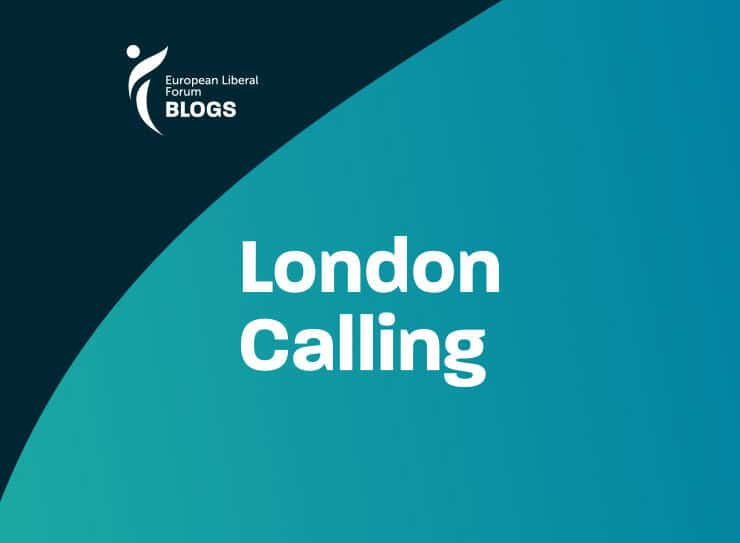1 March 2021
15 – Welcome to Britain?
ISSN: 2736-6065 Blog Post by Irina von Wiese, former LibDem MEP London Calling is the European Liberal Forum’s column aimed […]

ISSN: 2736-6065 Blog Post by Irina von Wiese, former LibDem MEP London Calling is the European Liberal Forum’s column aimed […]

ISSN: 2736-6065
Blog Post by Irina von Wiese, former LibDem MEP
London Calling is the European Liberal Forum’s column aimed at bridging the Channel.
Since 1 January, EU citizens coming to the UK to work or study, or to join their partners or families, have many more hurdles to overcome. These are not just practical and financial hurdles – they slow down human progress and turn back the clock on 70 years of European integration.
Freedom of movement within a vast territory of 28 EU member states was something many young people took for granted. In reality, it was won gradually, after many political and legal battles, over many years. At first, it was granted only to workers in the coal and steel industries in France, West Germany and the BeNeLux countries. Then, from 1957, people were gradually allowed to move freely within a growing number of EEC member states – but only for the purpose of work, and only for some employees during their term of employment. Freedom of movement for all workers was only fully implemented in 1968, and it wasn’t until 1992 that the concept of EU citizens was born, and with it the freedom for everyone to live, work, study and retire anywhere in the EU.
When, in 1996, I moved from Berlin to London to take up my first job in a British law firm, I already took that right for granted. Nobody questioned the legitimacy of my presence. My German legal qualification was recognised and, after sitting a ‘transfer test’, I was admitted to the Law Society of England and Wales. I did not have to repeat my studies or re-sit any examinations, nor did I depend on my employment to remain in the UK. For all practical purposes, I was treated no differently to my British colleagues.
For those arriving in the UK this year, things will be very different.
Under the new UK points-based immigration system, EU citizens (apart from Irish citizens, who are protected under the Common Travel Area arrangements) will have to apply for visas to study and work in the UK. In most cases, this is primarily a question of money: the cost of the visa itself (from £348 for students to £1408 for some skilled workers), and, more pertinently, the minimum salary / living expense thresholds. Most workers will need to show a job offer from an accredited UK employer with a salary of at least £25,600 – just under the average 2020 UK salary. Although some jobs in ‘shortage occupations’ are subject to slightly lower thresholds, this requirement will most certainly exclude thousands of seasonal and harvest workers, builders, waiters and teachers – jobs that were traditionally filled by EU citizens as there were simply not enough British people willing or able to meet the demand.
Worse affected will be academia, where minimum salary requirements are compounded by the end of EU research funding, as well as fewer EU students. The UK withdrawal from the Erasmus programme after 33 years – despite an offer by the EU to continue after Brexit – is a tragedy for both EU and British students. Erasmus not only enabled young people to study abroad – it opened up a new world of different cultures and languages, of mutual curiosity and understanding. Just as students emerge from 18 months of travel restrictions, remote learning, social isolation and inability to gain work experience, they find themselves faced with new hurdles. But these new borders are not justified by the need to keep people safe from a deadly virus – they are self-inflicted by those, mostly older people, who voted to sever ties with our closest neighbours. Young people had no say: Nobody born in this century was allowed to vote in the Brexit referendum. Those who were old enough overwhelmingly voted to remain in the EU. Yet they are the ones who will bear most of the Brexit burden.
Freedom of movement lies at the heart of EU citizenship. We all got used to having it, and for many British citizens, being deprived of it feels like an infringement of a fundamental right. But of course it isn’t: it is a privilege many people have fought hard to obtain, through a long process of negotiations, agreements and integration.
When the UK left the European Union, constituents wrote to me asking if there was a way to retain their EU citizenship, independently of their country’s membership in the EU. Under current EU law, there isn’t: EU citizenship comes with being a national of a member state. Citizenship, like immigration rules, is a core element of national sovereignty and therefore subject to national state legislation (the EU citizenship being the only exception). For the individual, however, citizenship is much more: a bundle of democratic rights, economic and personal freedoms, and cultural identity. An identity which is rarely linked to one nation state – I never found rivalry or schizophrenia in considering myself German, British and European. And I consider myself lucky to be able to keep – in law as well as spirit – all three identities.
Brexit has set the clock back to pre-1951, to a time when nation-states stood before the rubble of destroyed cities and wondered how they could re-build their continent without borders. In 2021, the British people need to begin from scratch.
Published by the European Liberal Forum. The opinions expressed in this publication are those of the author(s) and do not necessarily represent those of the European Liberal Forum.